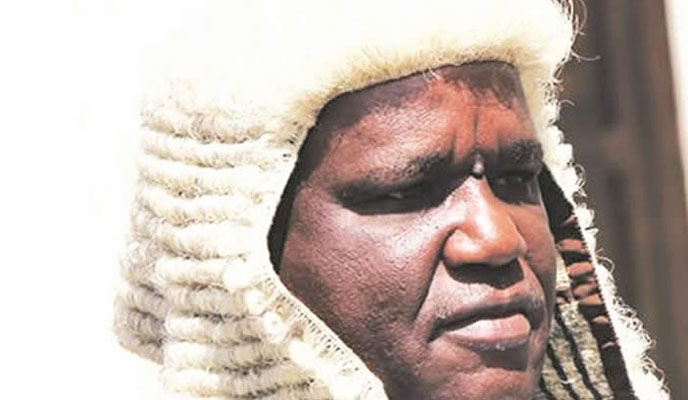
LAWYERS and human rights activists yesterday hailed the appointment of Justice Luke Malaba as the new Chief Justice (CJ) as a sober decision and based on merit.
By PAIDAMOYO MUZULU

Malaba’s shock appointment came as Zanu PF’s warring factions fought to influence President Robert Mugabe’s hand in finding retired Chief Justice Godfrey Chidyausiku’s replacement.
Justice Malaba’s appointment had been overshadowed by political and legal battles that played out within the corridors of power and in public in the aftermath of Justice Chidyausiku’s retirement late last month.
Harare mayor Bernard Manyenyeni said: “Malaba Deputy Chief Justice steps up to be CJ — what a sober outcome for our judiciary. They almost destroyed it [judiciary] all in the past few weeks. I was also very disturbed by what was beginning to look like a tribal elimination of the obvious choice.”
Opposition leader, senior High Court counsel and Supreme Court bar association president Tendai Biti weighed in, saying the appointment was well-earned.
“Congratulations to Chief Justice Malaba. It is a deserved and well-earned appointment. We now look forward to a new genre of progressive jurisprudence,” Biti said.
Justice Malaba’s appointment comes as the government is still steering in Parliament the Constitutional Amendment No.1 Bill that will change the manner in which judges are appointed. The current Section 180 of the Constitution provides for the appointment of judges through a process of public interviews by the Judicial Service Commission (JSC).
- Chamisa under fire over US$120K donation
- Mavhunga puts DeMbare into Chibuku quarterfinals
- Pension funds bet on Cabora Bassa oilfields
- Councils defy govt fire tender directive
Keep Reading
The amendment seeks to give the President powers to appoint the CJ, Judge President and head of the Labour Court after consultations with the JSC.
Ministry of Justice permanent secretary Virginia Mabhiza said the government would go ahead with the amendment of the Constitution.
“The amendment is meant for the future and we will continue with it and it will affect future appointments if adopted,” Mabhiza said.
She added the new development creates a vacancy for DCJ.
“After Justice Malaba’s appointment, the process of finding a substantive DCJ will start. It means the JSC will have to hold public interviews to fill in the vacancy in line with the law,” Mabhiza added.
Political activist Job Sikhala described Justice Malaba’s as a highly-esteemed jurist in the country.
“Despite challenges faced by those in the legal fraternity for many years on the independence of our judiciary, Justice Malaba is well respected across the judiciary fraternity. Many admire him for his development of our jurisprudence. He is seen as one of the best jurists Zimbabwe has ever produced,” Sikhala said.
Higher Education minister Jonathan Moyo described Malaba’s appointment as a “victory for the rule of law.”
Malaba, who is currently outside Zimbabwe on official duty, will be sworn in next week upon his return.
The appointment technically buries University of Zimbabwe law student Romeo Zibani’s Constitutional Court application that sought to stop the appointment of a CJ based on the interviews conducted in December last year.











